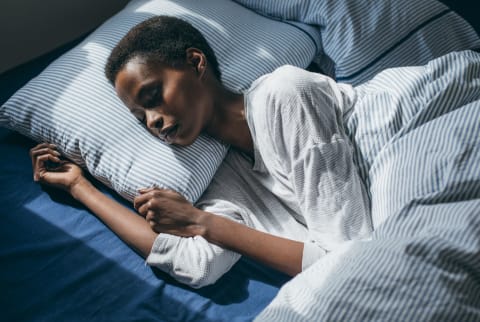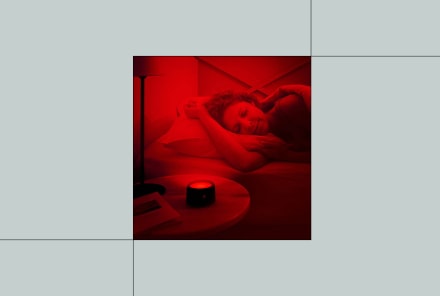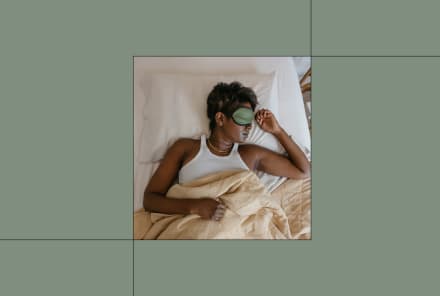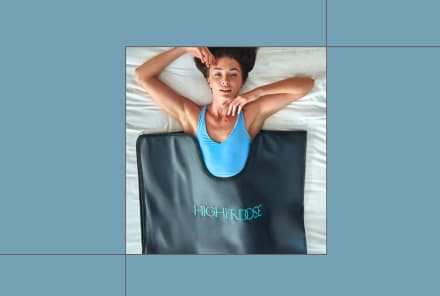Advertisement
The One Thing To Take Off Your Nightstand To Sleep Better (Nope, Not Your Phone)


If you've struggled with sleep in the past, chances are you've heard the advice to keep your bedroom cool, dark, and quiet. According to Matthew Walker, Ph.D., a renowned sleep researcher and professor at the University of California–Berkeley, there's one more quality that belongs on the list: Your room should also be clock-face-free.
Why you should remove clocks from your bedroom if you have trouble sleeping.
"If you are struggling with sleep, remove all clock faces from your bedroom," Walker advised on a recent episode of Peter Attia, M.D.'s podcast, The Drive. "It's not going to help you to know that it's now 2:35 a.m. and you still haven't been able to fall asleep." Not only will it not be helpful to see what time it is, he says, but it might actually mess with your ability to drift off.
For evidence, he points to a 2007 study published in the Journal of Behavior Therapy and Experimental Psychiatry. In it, 30 "good" sleepers and 30 "poor" sleepers were instructed to either monitor a clock or not monitor a clock for one night as they were trying to fall asleep. They rated their own worry levels and wore a wearable sleep monitor to gauge how the clock monitoring did or did not affect their rest.
"Compared to non-monitors, clock monitors reported more pre-sleep worry, and they experienced longer sleep onset latency," the report reads. Interestingly enough, this was true for both poor and good sleepers. In a follow-up study that focused only on poor sleepers and expanded the research window to three nights instead of one, the clock was still a source of pre-sleep worry.
The research team concluded that clocks serve to fuel sleep concerns, likening keeping one bedside to "sleeping with the enemy."
What to do without them.
This study shows that removing clocks from your bedroom can make falling asleep (or falling back asleep) a little less nerve-wracking. Without the constant ticking, you might find it a bit easier to drift off worry-free.
To do so, experts recommend reminding yourself that your body was made to sleep, and falling asleep is something that it knows how to do instinctively. (We love this inner dialogue that holistic psychiatrist Ellen Vora, M.D., uses in her own bedroom.) If upward of 20 minutes pass (give or take, since you won't have a clock to tell you!) and you're still awake, getting up to do something else until you feel more tired can help. This way, you won't start to associate your bed with sleeplessness, and it can remain your designated rest zone. But again, try not to look at the clock once you leave the room.
And what about come morning, when you're missing your alarm clock? Ideally, your sleep-wake schedule will be so consistent that you don't actually need one and you're able to wake up naturally. But if you're not quite there yet, these days you can also find alternatives that don't have clock faces, like sleep earbuds with built-in alarms or lights that wake you up by mimicking the sunrise. Of course, placing your alarm across the room where you won't be able to peek at it works in a pinch too.
The takeaway.
Looking at the clock late at night and into the wee hours of the morning can trigger negative thought loops—exactly what you don't want when you're trying to sleep. Remove the temptation by moving your phone and alarm clock away from your bed so you can fall asleep on your own time.
Watch Next
Enjoy some of our favorite clips from classes
Enjoy some of our favorite clips from classes
What Is Meditation?
Mindfulness/Spirituality | Light Watkins
Box Breathing
Mindfulness/Spirituality | Gwen Dittmar
What Breathwork Can Address
Mindfulness/Spirituality | Gwen Dittmar
The 8 Limbs of Yoga - What is Asana?
Yoga | Caley Alyssa
Two Standing Postures to Open Up Tight Hips
Yoga | Caley Alyssa
How Plants Can Optimize Athletic Performance
Nutrition | Rich Roll
What to Eat Before a Workout
Nutrition | Rich Roll
How Ayurveda Helps Us Navigate Modern Life
Nutrition | Sahara Rose
Messages About Love & Relationships
Love & Relationships | Esther Perel
Love Languages
Love & Relationships | Esther Perel
What Is Meditation?
Box Breathing
What Breathwork Can Address
The 8 Limbs of Yoga - What is Asana?
Two Standing Postures to Open Up Tight Hips
How Plants Can Optimize Athletic Performance
What to Eat Before a Workout
How Ayurveda Helps Us Navigate Modern Life
Messages About Love & Relationships
Love Languages
Advertisement

This Little-Known Supplement Helps Women Sleep & Decreases Signs Of Depression
Molly Knudsen, M.S., RDN

This Little-Known Supplement Helps Women Sleep & Decreases Signs Of Depression
Molly Knudsen, M.S., RDN
















